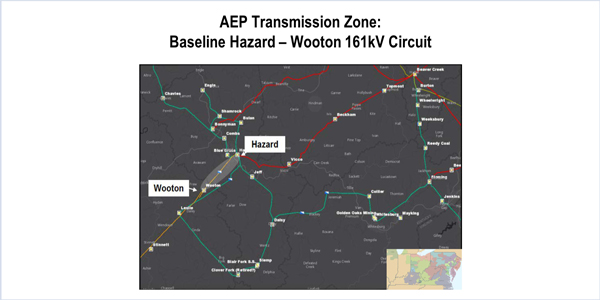By Rory D. Sweeney
Citing FERC’s concerns over supplemental transmission projects, Kentucky regulators have rejected upgrades to two substations, ruling that Kentucky Power failed to prove they were needed.
The Kentucky Public Service Commission released an order on March 16 granting a certificate of public convenience and necessity (CPCN) to Kentucky Power for a baseline project to rebuild a 161-kV line between its Hazard and Wooton substations but denied a CPCN for a more expensive supplemental project to make upgrades at the substations. Kentucky Power, a subsidiary of American Electric Power, estimated the baseline project to cost $20 million and the supplemental project another $24 million.
Baseline projects are administered by PJM to address violations of publicly available reliability criteria, while supplemental projects are developed internally by transmission owners and are not driven by RTO criteria. Supplementals are included with baseline projects in PJM’s Regional Transmission Expansion Plan to allow staff to identify possible reliability or operational performance issues, but they are not subject to staff oversight or approval. For years, several organizations representing demand-side interests have been clashing with TOs over the projects, arguing that TOs are incentivized by their formula rates to build as much as possible and that regulators’ oversight is not adequate to corral the impulse. Spending on supplementals has been on the rise, and critics believe TOs see them as an unsubstantiated way to build more. (See PJM TOs, Customers Await Ruling on Supplemental Projects.)
The PSC was unpersuaded by Kentucky Power’s contention that the supplemental made sense because engineering and construction resources would already be focused in that area. “This may speak to efficiency but not to necessity,” the commission said, noting that consideration of the projects happened through a PJM stakeholder process that FERC has since determined requires revision.
FERC ruled in February, following a 2015 technical conference and subsequent show-cause order in 2016, that TOs’ processes for receiving “meaningful input” from stakeholders on supplemental projects need additional structure to comply with Order 890 (EL16-71). TOs, through PJM, have subsequently submitted a proposed timeline for project consideration, but opponents have challenged the order as not sufficient. (See Group Contests ‘Supplementals’ Ruling as PJM, TOs Advance.)




